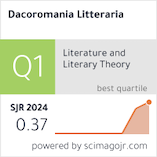DANIELA SPINA
WRITING NATIONAL HISTORY WITHOUT A NATION: THE CASE OF INDO-PORTUGUESE LITERARY HISTORY
DOI: https://doi.org/10.33993/drl.2019.6.96.110
Author's coordinates: University of Lisbon, Alameda da Universidade,1600–214,
Lisbon, Portugal.
Email: spinadaniela1@gmail.com
WRITING NATIONAL HISTORY WITHOUT A NATION: THE CASE OF INDO-PORTUGUESE LITERARY HISTORY
(Abstract)
This article aims to make a retrospective enquiry into the Indo-Portuguese literary history by looking at the particular part of the literature that was written by the Catholic community of Goa during the Portuguese rule in India. Although Indo-Portuguese literature does not represent national identity or national history, this article shows the way in which a national and narrative model has been followed by most of the authors writing about the literary history of Goa. It can be seen that concepts such as elite, caste and community substitute the concept of nation, but without, in fact, replacing the ideological and theoretical basis on which the national model of literary history was conceived in the 18th and 19th centuries in Europe. According to Linda Hutcheon (2002), the national and narrative type of literary history is also preferred even by Postcolonial literatures and by all those literatures that were excluded from the narratives of the Nation-State, referring to this choice as a political one. This theoretical frame will be the basis on which I built my argument.
Keywords: Indo-Portuguese literary history, Goa, national and narrative model, Postcolonial literatures, elite, caste, community, Portuguese colonialism.
SCRIIND ISTORIA NAȚIONALĂ ÎN ABSENȚA NAȚIUNII: CAZUL ISTORIEI LITERARE INDO-PORTUGHEZE
(Rezumat)
Lucrarea propune o revizitare a istoriei literare indo-portugheze prin focalizarea pe literatura scrisă de comunitatea catolică din Goa în timpul colonizării portugheze a Indiei. Cu toate că literatura indo-portugheză nu reflectă o identitate sau o istorie națională, acest articol dezvăluie că tocmai modelul național și narativ-teleologic a fost cel urmat de autorii care au scris despre istoria literară a Goa. Concepte precum elită, castă ori comunitate au înlocuit ideea de națiune, însă baza ideologică și teoretică a rămas tot scenariul istoriografic național instituit în Europa secolelor XVIII și XIX. Potrivit Lindei Hutcheon (2002), modelul național și narativ-teleologic al istoriei literare a fost preferat chiar și de literaturile postcoloniale ori de acelea care nu au putut avea acces la narațiunile identitare ale statului-național. Respectiva opțiune – căreia Hutcheon îi denunță motivațiile politice – constituie cadrul teoretic în care sunt dezvoltate argumentele acestui articol.
Cuvinte-cheie: istorie literară indo-portugheză, Goa, modelul național și narativ, literaturi postcoloniale, elită, castă, comunitate, colonialism portughez.


